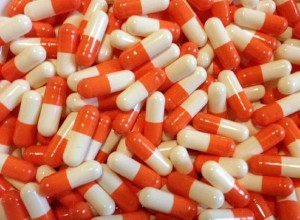Uses
Cloxacillin is used to treat a wide variety of bacterial infections. This medication is a type of penicillin antibiotic. It works by stopping the growth of bacteria.This antibiotic treats only bacterial infections. It will not work for viral infections (such as common cold, flu). Using any antibiotic when it is not needed can cause it to not work for future infections.
How to use Cloxacillin Capsule
Take this medication by mouth as directed by your doctor. This medication is best absorbed when taken on an empty stomach (1 hour before or 2 hours after meals).
If you are using the liquid suspension form of this medicine, shake the bottle well before each dose.
The dosage is based on your medical condition and response to therapy. In children, the dosage is also based on weight and age.
For the best effect, take this antibiotic at evenly spaced times. To help you remember, take this medication at the same time(s) every day.
Continue to take this medication until the full prescribed amount is finished, even if symptoms disappear after a few days. Stopping the medication too early may allow bacteria to continue to grow, which may result in a relapse of the infection.
Inform your doctor if your condition persists or worsens.
Side Effects
Upset stomach, nausea, vomiting, diarrhea, gas, and mouth sores may occur. If any of these effects persist or worsen, notify your doctor or pharmacist promptly.
Although uncommon, you may develop a black, “hairy” tongue while taking this medication. This effect is harmless and usually goes away after treatment. Maintain good oral hygiene, and brush your tongue with a soft toothbrush twice a day. Consult your doctor or pharmacist for more information.
Remember that this medication has been prescribed because your doctor has judged that the benefit to you is greater than the risk of side effects. Many people using this medication do not have serious side effects.
Tell your doctor right away if you have any serious side effects, including: unusual tiredness, persistent sore throat, muscle aches, joint pain/swelling, easy bruising/bleeding, signs of kidney problems (such as change in the amount of urine, pink urine), dark urine, persistent nausea/vomiting, stomach/abdominal pain, yellowing eyes/skin.
This medication may rarely cause a severe intestinal condition due to a bacteria called C. difficile. This condition may occur during treatment or weeks to months after treatment has stopped. Tell your doctor right away if you develop: diarrhea that doesn’t stop, abdominal or stomach pain/cramping, blood/mucus in your stool.
If you have these symptoms, do not use anti-diarrhea or opioid products because they may make symptoms worse.
Use of this medication for prolonged or repeated periods may result in oral thrush or a new vaginal yeast infection (oral or vaginal fungal infection). Contact your doctor if you notice white patches in your mouth, a change in vaginal discharge or other new symptoms.
A very serious allergic reaction to this drug is rare. However, get medical help right away if you notice any symptoms of a serious allergic reaction, including: rash, itching/swelling (especially of the face/tongue/throat), new fever, chills, severe dizziness, trouble breathing.
This is not a complete list of possible side effects. If you notice other effects not listed above, contact your doctor or pharmacist.
Precautions
Before taking cloxacillin, tell your doctor or pharmacist if you are allergic to it; or to other antibiotics including penicillin-type medications (such as amoxicillin, ampicillin, penicillin) or cephalosporins (such as cephalexin, cefuroxime); or if you have any other allergies. This product may contain inactive ingredients, which can cause allergic reactions or other problems. Talk to your pharmacist for more details.
Before using this medication, tell your doctor or pharmacist your medical history, especially of: kidney problems.
Cloxacillin may cause live bacterial vaccines (such as typhoid vaccine) to not work well. Tell your health care professional that you are using cloxacillin before having any immunizations/vaccinations.
Kidney function declines as you grow older. This medication is removed by the kidneys. Elderly people may be more sensitive to this drug.
Kidney function is not fully developed in newborns. This medication is removed by the kidneys. Newborns may be more sensitive to this drug.
Interactions
Drug interactions may change how your medications work or increase your risk for serious side effects. This document does not contain all possible drug interactions. Keep a list of all the products you use (including prescription/nonprescription drugs and herbal products) and share it with your doctor and pharmacist. Do not start, stop, or change the dosage of any medicines without your doctor’s approval.
Some products that may interact with this drug are: fusidic acid, methotrexate, tetracyclines, warfarin, khat, guar gum.
Cloxacillin may cause false positive results with certain diabetic urine testing products (cupric sulfate-type). This drug may also affect the results of certain lab tests. Make sure laboratory personnel and your doctors know you use this drug.
Post time: Mar-03-2023





